人教版八年级上册Unit 1 Where did you go on vacation? Section A(Grammar Focus-3c)课件(共42张PPT)
文档属性
| 名称 | 人教版八年级上册Unit 1 Where did you go on vacation? Section A(Grammar Focus-3c)课件(共42张PPT) | 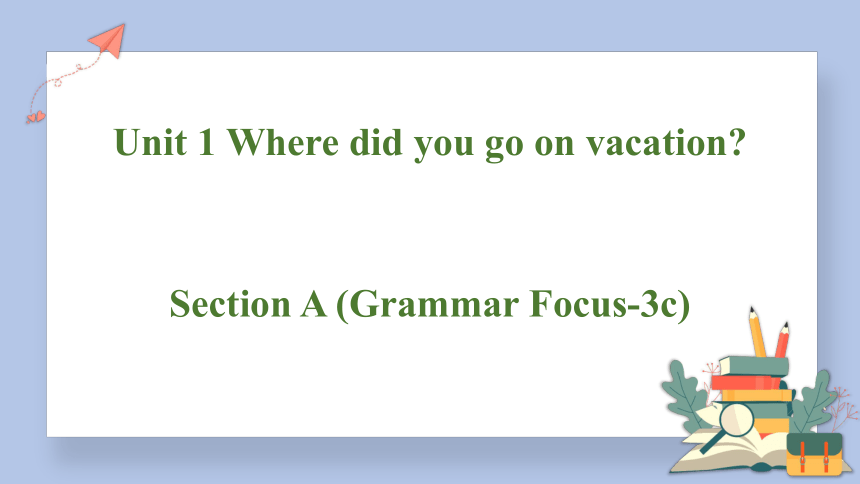 | |
| 格式 | zip | ||
| 文件大小 | 1.5MB | ||
| 资源类型 | 教案 | ||
| 版本资源 | 人教新目标(Go for it)版 | ||
| 科目 | 英语 | ||
| 更新时间 | 2022-09-20 15:58:44 | ||
图片预览

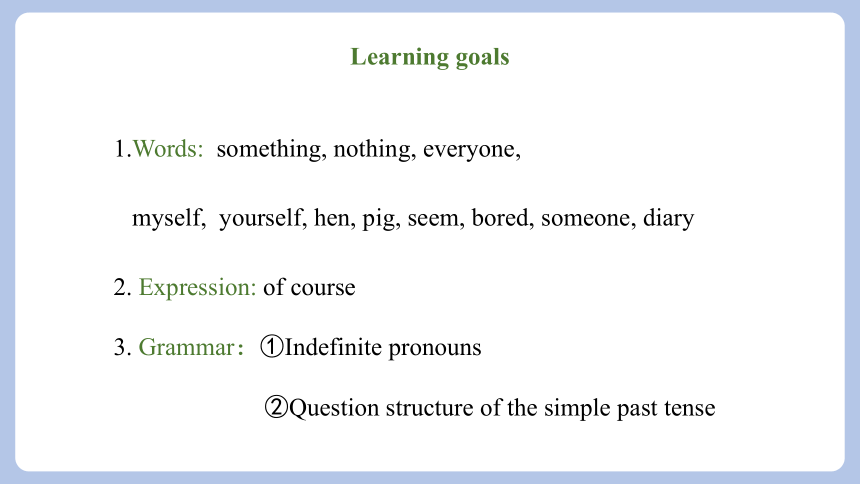
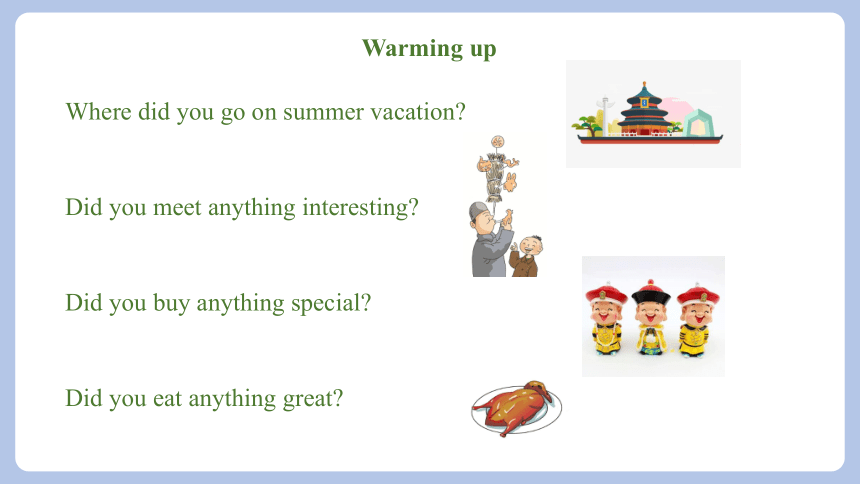
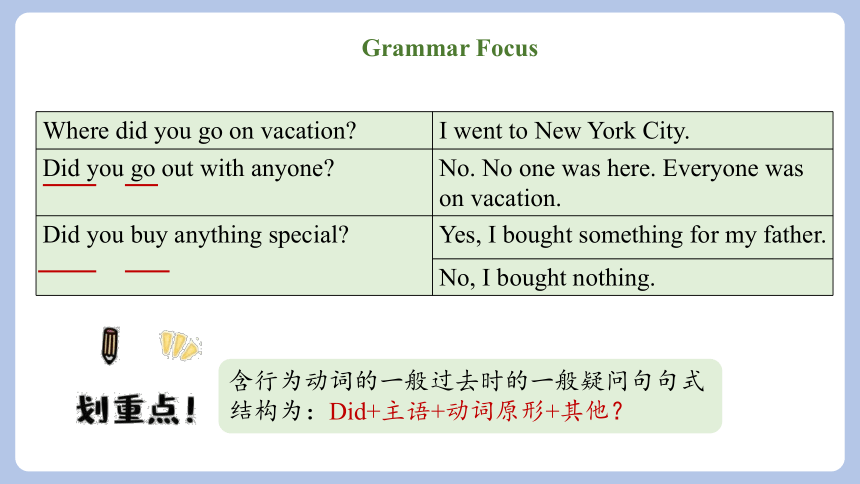
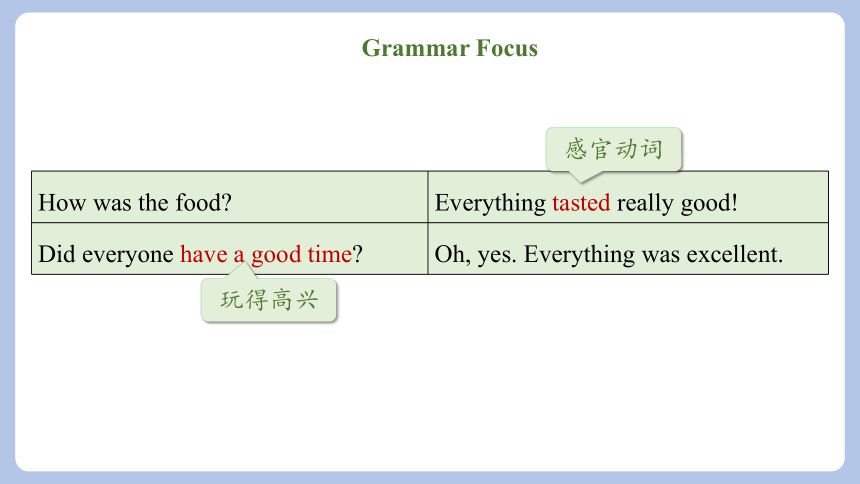
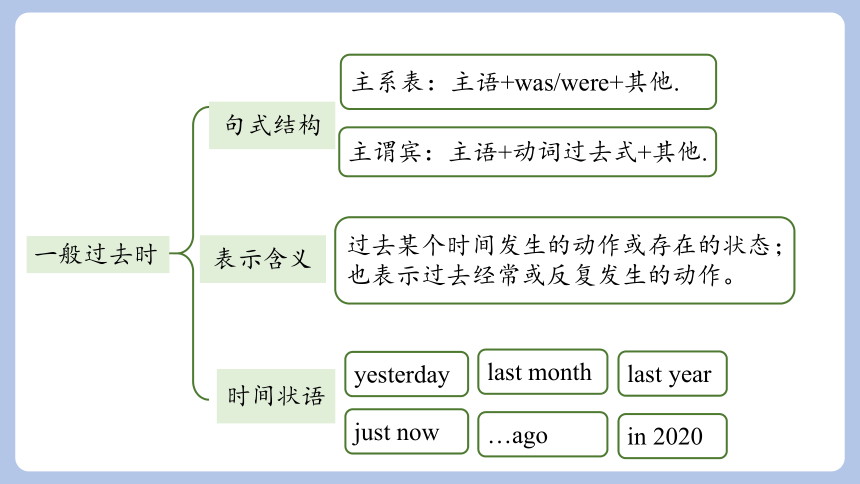
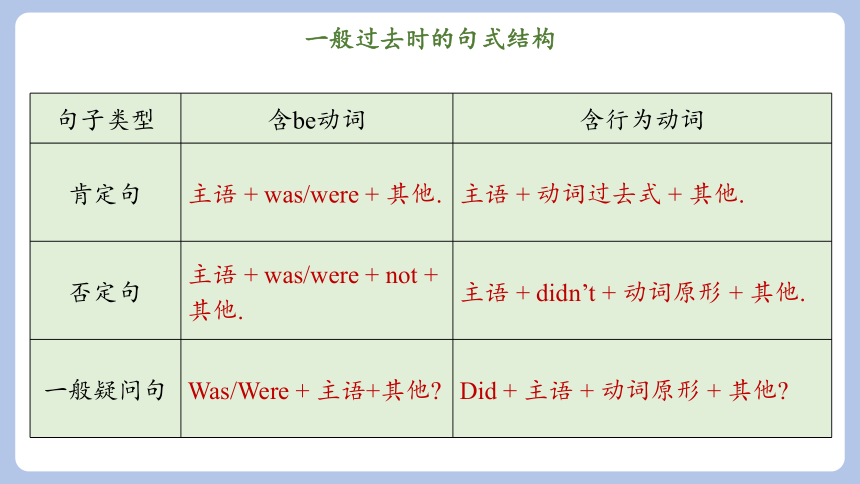
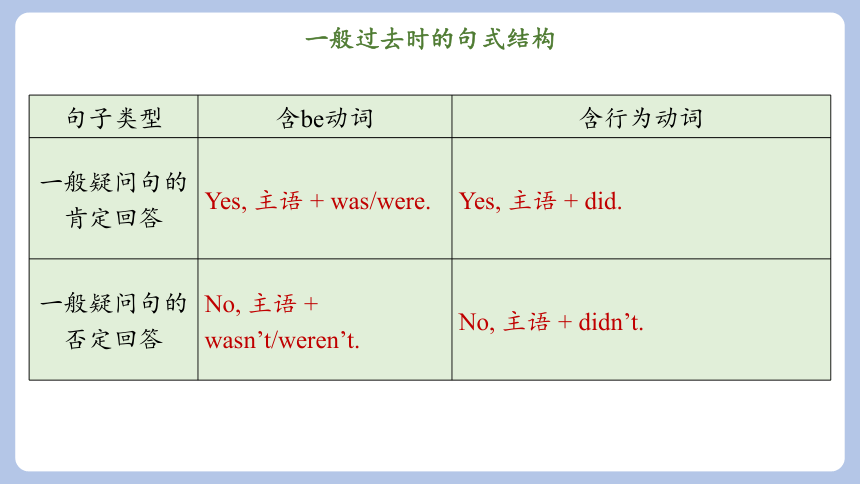
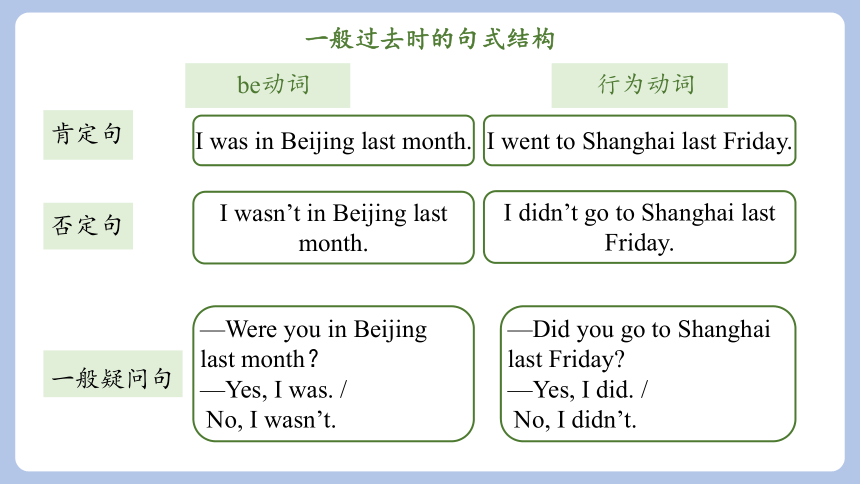
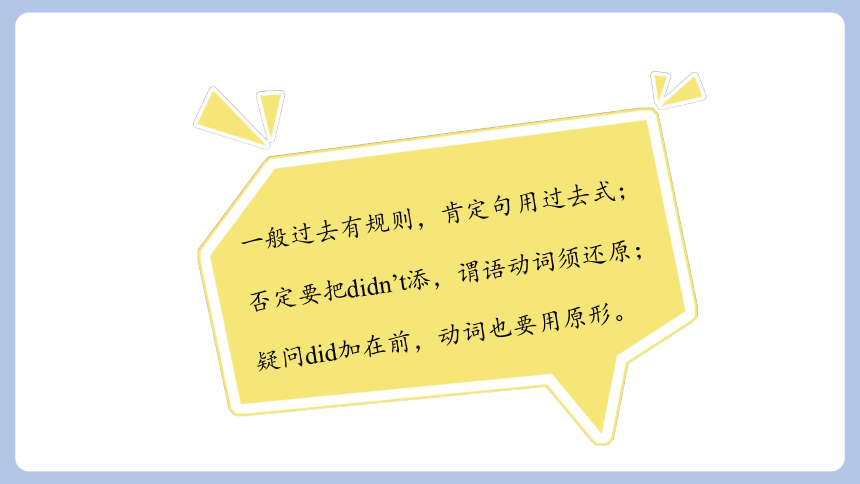
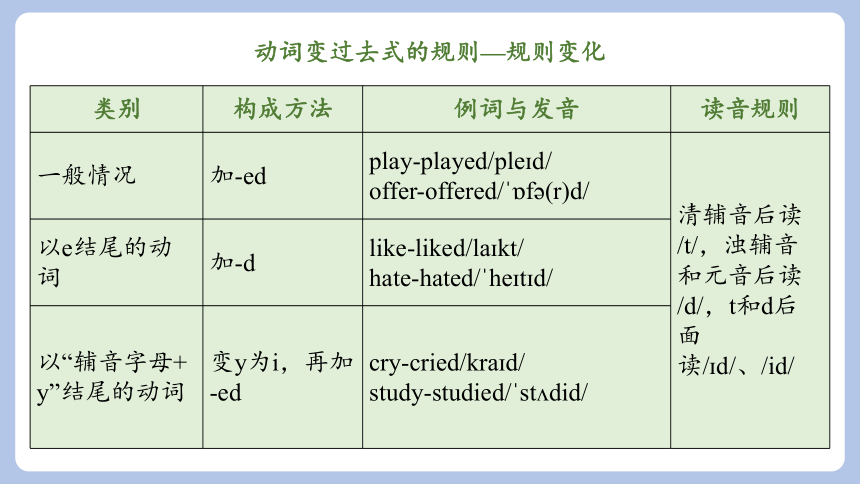
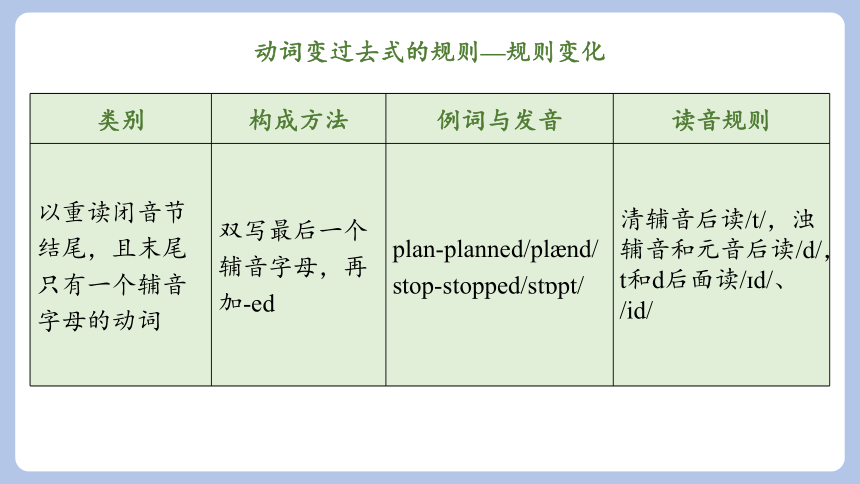
文档简介
(共42张PPT)
Unit 1 Where did you go on vacation
Section A (Grammar Focus-3c)
1.Words: something, nothing, everyone,
myself, yourself, hen, pig, seem, bored, someone, diary
2. Expression: of course
3. Grammar:①Indefinite pronouns
②Question structure of the simple past tense
Learning goals
Warming up
Where did you go on summer vacation
Did you meet anything interesting
Did you buy anything special
Did you eat anything great
Where did you go on vacation I went to New York City.
Did you go out with anyone No. No one was here. Everyone was on vacation.
Did you buy anything special Yes, I bought something for my father.
No, I bought nothing.
Grammar Focus
含行为动词的一般过去时的一般疑问句句式结构为:Did+主语+动词原形+其他?
How was the food Everything tasted really good!
Did everyone have a good time Oh, yes. Everything was excellent.
感官动词
玩得高兴
Grammar Focus
句式结构
表示含义
时间状语
主系表:主语+was/were+其他.
主谓宾:主语+动词过去式+其他.
过去某个时间发生的动作或存在的状态;也表示过去经常或反复发生的动作。
yesterday
last month
last year
just now
…ago
in 2020
一般过去时
句子类型 含be动词 含行为动词
肯定句 主语 + was/were + 其他. 主语 + 动词过去式 + 其他.
否定句 主语 + was/were + not + 其他. 主语 + didn’t + 动词原形 + 其他.
一般疑问句 Was/Were + 主语+其他 Did + 主语 + 动词原形 + 其他
一般过去时的句式结构
句子类型 含be动词 含行为动词
一般疑问句的肯定回答 Yes, 主语 + was/were. Yes, 主语 + did.
一般疑问句的否定回答 No, 主语 + wasn’t/weren’t. No, 主语 + didn’t.
一般过去时的句式结构
I was in Beijing last month.
I went to Shanghai last Friday.
I wasn’t in Beijing last month.
I didn’t go to Shanghai last Friday.
—Were you in Beijing last month?
—Yes, I was. /
No, I wasn’t.
—Did you go to Shanghai last Friday
—Yes, I did. /
No, I didn’t.
肯定句
否定句
一般疑问句
be动词
行为动词
一般过去时的句式结构
一般过去有规则,肯定句用过去式;
否定要把didn’t添,谓语动词须还原;
疑问did加在前,动词也要用原形。
动词变过去式的规则—规则变化
类别 构成方法 例词与发音 读音规则
一般情况 加-ed play-played/ple d/ offer-offered/ f (r)d/ 清辅音后读/t/,浊辅音和元音后读/d/,t和d后面
读/ d/、/id/
以e结尾的动词 加-d like-liked/la kt/ hate-hated/ he t d/ 以“辅音字母+ y”结尾的动词 变y为i,再加-ed cry-cried/kra d/ study-studied/ st did/ 类别 构成方法 例词与发音 读音规则
以重读闭音节结尾,且末尾只有一个辅音字母的动词 双写最后一个辅音字母,再加-ed plan-planned/pl nd/ stop-stopped/st pt/ 清辅音后读/t/,浊辅音和元音后读/d/,t和d后面读/ d/、
/id/
动词变过去式的规则—规则变化
类别 例词
过去式和原形一样 cut-cut read-read put-put
中间元音字母变化 i-a swim-swam begin-began sit-sat
i-o ride-rode drive-drove write-wrote
以ow/aw结尾的词,把ow/aw变成ew draw-drew throw-threw blow-blew
结尾的d变为t build-built spend-spent lend-lent
动词变过去式的规则—不规则变化
类别 例词
过去式以o(a)ught 结尾 bring-brought teach-taught catch-caught
以n结尾的词,在词尾加t mean-meant burn-burnt learn-learnt
含有双写字母的词,将双写改为单写,在词尾加t feel-felt smell-smelt keep-kept
动词变过去式的规则—不规则变化
一般过去时的时间状语
yesterday, last month, last year, just now, ...ago
Where did you go on vacation I went to New York City.
Did you go out with anyone No. No one was here. Everyone was on vacation.
Did you buy anything special Yes, I bought something for my father.
No, I bought nothing.
Read and find the compound indefinite pronouns.
How was the food Everything tasted really good!
Did everyone have a good time Oh, yes. Everything was excellent.
Classify these compound indefinite pronouns.
For people For things
everyone
someone
nothing
anyone
something
anything
no one
everything
复合不定代词是由some、any、 no、every加上-body、-one、-thing构成的不定代词。功能相当于名词,在句中可作主语、宾语或表语,不能作定语。
复合不定代词
some-类 any-类 no-类 every-类
-body somebody某人;有人 anybody 任何人 nobody 没有人 everybody
每人;人人;所有人
-one someone 某人;有人 anyone 任何人 no one 没有人 everyone
每人;人人;所有人
复合不定代词的种类
-thing something 某事;某物 anything 任何东西;任何事物 nothing 没有什么 everything
每件事;所有事物;
一切
1.复合不定代词作主语时,谓语动词要用单数形式。
2.复合不定代词被定语(形容词、不定式、else等)修饰时,定语要后置。
Everyone wants to have a long holiday.
There is something important in today’s newspaper.
复合不定代词的用法
复合代词要牢记,修饰成分后边放,
如若它来作主语,谓语单数没商量。
some-代词肯定句,any-代词否、疑忙,
若是希望得肯定,some-代词不相让。
anyone something anything everything nothing
Linda: Did you do _________ fun on your vacation, Alice
Alice: Yes, I did. I went to Sanya.
Linda: How did you like it
Alice: Well, it was my first time there, so __________ was really interesting.
Linda: Did you go with ________
anything
everything
anyone
Fill in the blanks with the words in the box and practice the conversation.
3a
Alice: Yes, I did. I went with my sister.
Linda: Did you go shopping
Alice: Of course! I bought __________ for my parents, but ________ for myself.
Linda: Why didn’t you buy _________ for yourself
Alice: I didn’t really see__________ I liked.
something
nothing
anything
anything
1. Yes, I bought something for my father.
buy sth. for sb.为某人买某物(buy的过去式是bought)
buy sth. for sb.= buy sb. sth.
(当sb. 和 sth.都为代词时,只能用buy sth. for sb.)
I bought a scarf for my mother on her birthday.
Language points
buy sth. for sb.为某人买某物
2. I bought something for my parents, but nothing for myself.
我给我父母买了一些东西,但是没有给我自己买。
myself pron.我自己,我本人
反身代词本身不能单独作主语。
I kept telling myself to keep calm.
Language points
【拓展】
(1)常见的反身代词如下:
(2)常见的含反身代词的固定搭配:
enjoy oneself 玩得高兴
help oneself to…随便吃/喝……
teach oneself 自学
lose oneself in 沉迷于,陶醉于
Language points
单数 myself yourself himself
复数 Ourselves yourselves Themselves
【活学活用】
—Jim, please hep ________ to some bread.
—Thank you.
A. himself B. yourself C. herself D. myself
B
3. Everything tasted really good!
每样东西尝起来确实不错!
taste意为“尝起来”,是系动词,后常接形容词作表语。
Language points
【拓展】类似用法的词还有:
Language points
词汇 smell sound feel Look
意义 闻起来 听起来 感觉;摸起来 看起来
The cake tastes great!
anything everything nothing everyone no one
Dear Bill,
How was your vacation Did you do _________ interesting Did _________________ in the family go with you I went to a friend’s farm in the countryside with my family. ___________was great. We fed some hens and saw some baby pigs. They were so cute! The only problem was that there was _________ much to do in the evening but read. Still ___________seemed to be bored. Bye for now!
Mark
anything
everyone/anyone
Everything
Fill in the blanks in the e-mail message with the words in the box.
3b
nothing
no one
Where did Mark go on vacation
How was his vacation
What animal did they feed
What was the problem
Did anyone seem bored
Read the e-mail message with questions
He went to a friend’s farm in the countryside with his family.
Everything was great!
They fed some hens and saw some baby pigs.
The only problem was that there was nothing much to do in the evening but read.
No, they didn’t.
3.Still no one seemed to be bored.
然而,没有人看起来厌倦。
bored意为“厌倦的,烦闷的”,常指人或动物等的厌烦状态。
I feel bored in the match class.
Language points
【拓展】
(1)seem的常用句型(有时它们之间可相互转换):
①主语+seem+(to be)+表语(形容词/名词等)。
②It seems/seemed that+从句。
③主语+seem+动词不定式。
He seems(to be) a clever boy.
=It seems that he is a clever boy.
He seemed to know everything.
=It seemed that he knew everything.
Language points
【拓展】
(2)boring 意为“令人烦恼的,无聊的”,常指某事物给人的感觉。
I think math is boring.
Language points
【活学活用】
1. Linda seems ________ the answer.
A. know B. knowing C. to know D. knew
2. 用boring或bored填空。
She is ________ with her _________ job.
C
bored
boring
3c Ask your group questions about their last vacation. Then tell the class your results.
Did you… Everyone Someone (write the classmate’s name) No one
eat anything at a restaurant
read anything interesting
Summary
Where did you go on vacation
Words
Useful expressions
of course, buy sth. for sb.
Grammar
①Indefinite pronouns
②Question structure of the simple past tense
something, nothing,everyone, myself, yourself,
hen, pig, seem, bored, someone, diary,taste
Exercises
根据句意及首字母提示完成单词。
1. Bill, why not buy something for y_________
2. N_______is difficult if you put your heart into it.
3. The talk show isn' t interesting .Everyone s______bored.
4. My daughter keeps a d________ in Eng lish every day.
5. Mark' s father fed many h________and two baby pigs.
ourself
othing
eems
iary
ens
Exercises
用所给单词的适当形式填空。
someone, something, nothing, anyone, everyone
1.—Does ________know the doctor
—Yes, Zhang Kai does.
2. The box is too heavy.Why don’t you ask________to help you
3.—Is _______here today,Li Bin
—Yes, bout her.
4. Who is Sally I know _________about her.
5 . You can do____________fun there.
anyone
someone
everyone
nothing
something
Exercises
根据汉语意思完成句子,没空一词。
1. 我和家人一起去了一位朋友的农场。
I went to a ______ ______ ______my family.
2.汤姆!随便吃些苹果。
Help________ ___some apples,Tom!
3.—那些食物怎么样 —一切尝起来不错。
—How was the food good.
—_______ ________ good.
friend's
farm
with
yourself
to
Everything
tasted
Homework
1. Review and recite the use of the simple past tense and compound indefinite pronouns.
2. Use the simple past tense to describe your trip. Use compound indefinite pronouns as much as possible in your passage.
Unit 1 Where did you go on vacation
Section A (Grammar Focus-3c)
1.Words: something, nothing, everyone,
myself, yourself, hen, pig, seem, bored, someone, diary
2. Expression: of course
3. Grammar:①Indefinite pronouns
②Question structure of the simple past tense
Learning goals
Warming up
Where did you go on summer vacation
Did you meet anything interesting
Did you buy anything special
Did you eat anything great
Where did you go on vacation I went to New York City.
Did you go out with anyone No. No one was here. Everyone was on vacation.
Did you buy anything special Yes, I bought something for my father.
No, I bought nothing.
Grammar Focus
含行为动词的一般过去时的一般疑问句句式结构为:Did+主语+动词原形+其他?
How was the food Everything tasted really good!
Did everyone have a good time Oh, yes. Everything was excellent.
感官动词
玩得高兴
Grammar Focus
句式结构
表示含义
时间状语
主系表:主语+was/were+其他.
主谓宾:主语+动词过去式+其他.
过去某个时间发生的动作或存在的状态;也表示过去经常或反复发生的动作。
yesterday
last month
last year
just now
…ago
in 2020
一般过去时
句子类型 含be动词 含行为动词
肯定句 主语 + was/were + 其他. 主语 + 动词过去式 + 其他.
否定句 主语 + was/were + not + 其他. 主语 + didn’t + 动词原形 + 其他.
一般疑问句 Was/Were + 主语+其他 Did + 主语 + 动词原形 + 其他
一般过去时的句式结构
句子类型 含be动词 含行为动词
一般疑问句的肯定回答 Yes, 主语 + was/were. Yes, 主语 + did.
一般疑问句的否定回答 No, 主语 + wasn’t/weren’t. No, 主语 + didn’t.
一般过去时的句式结构
I was in Beijing last month.
I went to Shanghai last Friday.
I wasn’t in Beijing last month.
I didn’t go to Shanghai last Friday.
—Were you in Beijing last month?
—Yes, I was. /
No, I wasn’t.
—Did you go to Shanghai last Friday
—Yes, I did. /
No, I didn’t.
肯定句
否定句
一般疑问句
be动词
行为动词
一般过去时的句式结构
一般过去有规则,肯定句用过去式;
否定要把didn’t添,谓语动词须还原;
疑问did加在前,动词也要用原形。
动词变过去式的规则—规则变化
类别 构成方法 例词与发音 读音规则
一般情况 加-ed play-played/ple d/ offer-offered/ f (r)d/ 清辅音后读/t/,浊辅音和元音后读/d/,t和d后面
读/ d/、/id/
以e结尾的动词 加-d like-liked/la kt/ hate-hated/ he t d/ 以“辅音字母+ y”结尾的动词 变y为i,再加-ed cry-cried/kra d/ study-studied/ st did/ 类别 构成方法 例词与发音 读音规则
以重读闭音节结尾,且末尾只有一个辅音字母的动词 双写最后一个辅音字母,再加-ed plan-planned/pl nd/ stop-stopped/st pt/ 清辅音后读/t/,浊辅音和元音后读/d/,t和d后面读/ d/、
/id/
动词变过去式的规则—规则变化
类别 例词
过去式和原形一样 cut-cut read-read put-put
中间元音字母变化 i-a swim-swam begin-began sit-sat
i-o ride-rode drive-drove write-wrote
以ow/aw结尾的词,把ow/aw变成ew draw-drew throw-threw blow-blew
结尾的d变为t build-built spend-spent lend-lent
动词变过去式的规则—不规则变化
类别 例词
过去式以o(a)ught 结尾 bring-brought teach-taught catch-caught
以n结尾的词,在词尾加t mean-meant burn-burnt learn-learnt
含有双写字母的词,将双写改为单写,在词尾加t feel-felt smell-smelt keep-kept
动词变过去式的规则—不规则变化
一般过去时的时间状语
yesterday, last month, last year, just now, ...ago
Where did you go on vacation I went to New York City.
Did you go out with anyone No. No one was here. Everyone was on vacation.
Did you buy anything special Yes, I bought something for my father.
No, I bought nothing.
Read and find the compound indefinite pronouns.
How was the food Everything tasted really good!
Did everyone have a good time Oh, yes. Everything was excellent.
Classify these compound indefinite pronouns.
For people For things
everyone
someone
nothing
anyone
something
anything
no one
everything
复合不定代词是由some、any、 no、every加上-body、-one、-thing构成的不定代词。功能相当于名词,在句中可作主语、宾语或表语,不能作定语。
复合不定代词
some-类 any-类 no-类 every-类
-body somebody某人;有人 anybody 任何人 nobody 没有人 everybody
每人;人人;所有人
-one someone 某人;有人 anyone 任何人 no one 没有人 everyone
每人;人人;所有人
复合不定代词的种类
-thing something 某事;某物 anything 任何东西;任何事物 nothing 没有什么 everything
每件事;所有事物;
一切
1.复合不定代词作主语时,谓语动词要用单数形式。
2.复合不定代词被定语(形容词、不定式、else等)修饰时,定语要后置。
Everyone wants to have a long holiday.
There is something important in today’s newspaper.
复合不定代词的用法
复合代词要牢记,修饰成分后边放,
如若它来作主语,谓语单数没商量。
some-代词肯定句,any-代词否、疑忙,
若是希望得肯定,some-代词不相让。
anyone something anything everything nothing
Linda: Did you do _________ fun on your vacation, Alice
Alice: Yes, I did. I went to Sanya.
Linda: How did you like it
Alice: Well, it was my first time there, so __________ was really interesting.
Linda: Did you go with ________
anything
everything
anyone
Fill in the blanks with the words in the box and practice the conversation.
3a
Alice: Yes, I did. I went with my sister.
Linda: Did you go shopping
Alice: Of course! I bought __________ for my parents, but ________ for myself.
Linda: Why didn’t you buy _________ for yourself
Alice: I didn’t really see__________ I liked.
something
nothing
anything
anything
1. Yes, I bought something for my father.
buy sth. for sb.为某人买某物(buy的过去式是bought)
buy sth. for sb.= buy sb. sth.
(当sb. 和 sth.都为代词时,只能用buy sth. for sb.)
I bought a scarf for my mother on her birthday.
Language points
buy sth. for sb.为某人买某物
2. I bought something for my parents, but nothing for myself.
我给我父母买了一些东西,但是没有给我自己买。
myself pron.我自己,我本人
反身代词本身不能单独作主语。
I kept telling myself to keep calm.
Language points
【拓展】
(1)常见的反身代词如下:
(2)常见的含反身代词的固定搭配:
enjoy oneself 玩得高兴
help oneself to…随便吃/喝……
teach oneself 自学
lose oneself in 沉迷于,陶醉于
Language points
单数 myself yourself himself
复数 Ourselves yourselves Themselves
【活学活用】
—Jim, please hep ________ to some bread.
—Thank you.
A. himself B. yourself C. herself D. myself
B
3. Everything tasted really good!
每样东西尝起来确实不错!
taste意为“尝起来”,是系动词,后常接形容词作表语。
Language points
【拓展】类似用法的词还有:
Language points
词汇 smell sound feel Look
意义 闻起来 听起来 感觉;摸起来 看起来
The cake tastes great!
anything everything nothing everyone no one
Dear Bill,
How was your vacation Did you do _________ interesting Did _________________ in the family go with you I went to a friend’s farm in the countryside with my family. ___________was great. We fed some hens and saw some baby pigs. They were so cute! The only problem was that there was _________ much to do in the evening but read. Still ___________seemed to be bored. Bye for now!
Mark
anything
everyone/anyone
Everything
Fill in the blanks in the e-mail message with the words in the box.
3b
nothing
no one
Where did Mark go on vacation
How was his vacation
What animal did they feed
What was the problem
Did anyone seem bored
Read the e-mail message with questions
He went to a friend’s farm in the countryside with his family.
Everything was great!
They fed some hens and saw some baby pigs.
The only problem was that there was nothing much to do in the evening but read.
No, they didn’t.
3.Still no one seemed to be bored.
然而,没有人看起来厌倦。
bored意为“厌倦的,烦闷的”,常指人或动物等的厌烦状态。
I feel bored in the match class.
Language points
【拓展】
(1)seem的常用句型(有时它们之间可相互转换):
①主语+seem+(to be)+表语(形容词/名词等)。
②It seems/seemed that+从句。
③主语+seem+动词不定式。
He seems(to be) a clever boy.
=It seems that he is a clever boy.
He seemed to know everything.
=It seemed that he knew everything.
Language points
【拓展】
(2)boring 意为“令人烦恼的,无聊的”,常指某事物给人的感觉。
I think math is boring.
Language points
【活学活用】
1. Linda seems ________ the answer.
A. know B. knowing C. to know D. knew
2. 用boring或bored填空。
She is ________ with her _________ job.
C
bored
boring
3c Ask your group questions about their last vacation. Then tell the class your results.
Did you… Everyone Someone (write the classmate’s name) No one
eat anything at a restaurant
read anything interesting
Summary
Where did you go on vacation
Words
Useful expressions
of course, buy sth. for sb.
Grammar
①Indefinite pronouns
②Question structure of the simple past tense
something, nothing,everyone, myself, yourself,
hen, pig, seem, bored, someone, diary,taste
Exercises
根据句意及首字母提示完成单词。
1. Bill, why not buy something for y_________
2. N_______is difficult if you put your heart into it.
3. The talk show isn' t interesting .Everyone s______bored.
4. My daughter keeps a d________ in Eng lish every day.
5. Mark' s father fed many h________and two baby pigs.
ourself
othing
eems
iary
ens
Exercises
用所给单词的适当形式填空。
someone, something, nothing, anyone, everyone
1.—Does ________know the doctor
—Yes, Zhang Kai does.
2. The box is too heavy.Why don’t you ask________to help you
3.—Is _______here today,Li Bin
—Yes, bout her.
4. Who is Sally I know _________about her.
5 . You can do____________fun there.
anyone
someone
everyone
nothing
something
Exercises
根据汉语意思完成句子,没空一词。
1. 我和家人一起去了一位朋友的农场。
I went to a ______ ______ ______my family.
2.汤姆!随便吃些苹果。
Help________ ___some apples,Tom!
3.—那些食物怎么样 —一切尝起来不错。
—How was the food good.
—_______ ________ good.
friend's
farm
with
yourself
to
Everything
tasted
Homework
1. Review and recite the use of the simple past tense and compound indefinite pronouns.
2. Use the simple past tense to describe your trip. Use compound indefinite pronouns as much as possible in your passage.
同课章节目录
- Unit 1 Where did you go on vacation?
- Section A
- Section B
- Unit 2 How often do you exercise?
- Section A
- Section B
- Unit 3 I'm more outgoing than my sister.
- Section A
- Section B
- Unit 4 What's the best movie theater?
- Section A
- Section B
- Unit 5 Do you want to watch a game show?
- Section A
- Section B
- Unit 6 I'm going to study computer science.
- Section A
- Section B
- Unit 7 Will people have robots?
- Section A
- Section B
- Unit 8 How do you make a banana milk shake?
- Section A
- Section B
- Unit 9 Can you come to my party?
- Section A
- Section B
- Unit 10 If you go to the party, you'll have a grea
- Section A
- Section B
